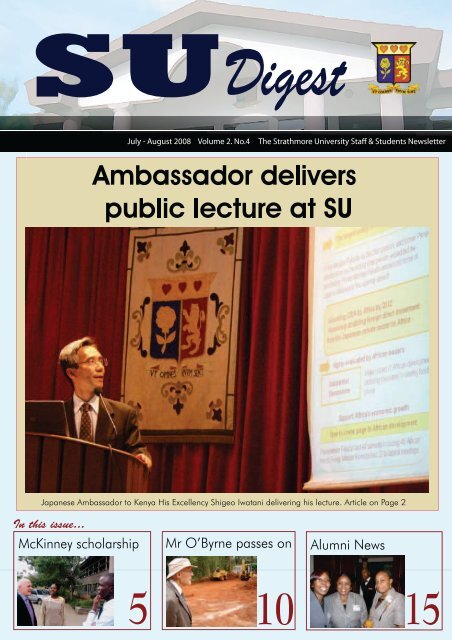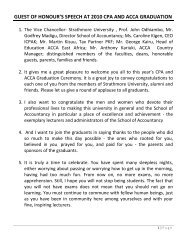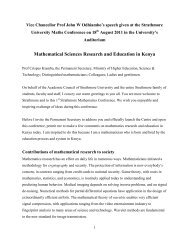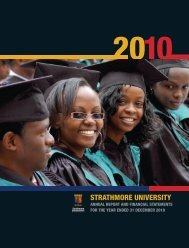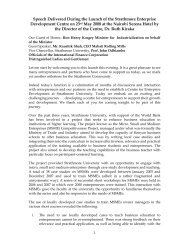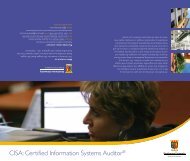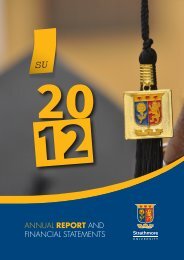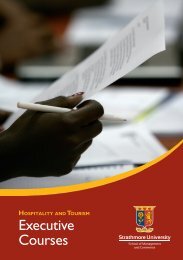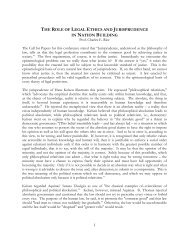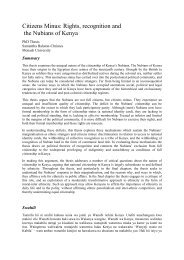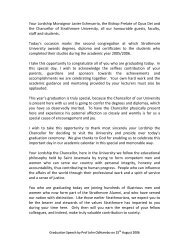SU Digest - Strathmore University
SU Digest - Strathmore University
SU Digest - Strathmore University
- No tags were found...
Create successful ePaper yourself
Turn your PDF publications into a flip-book with our unique Google optimized e-Paper software.
The Institute of Continuing Education (ICE) on Friday, 23rdMay launched the <strong>Strathmore</strong> Enterprise DevelopmentCentre (SEDC). “We have come here todayto witness the birth of one of the mostimportant players in Kenya’s economicdevelopment agenda,” said industrialistManu Chandaria in a speech read on hisbehalf.SEDC’s primary objective is to help ownermanagers of SMEs develop competenciesto effectively manage the growth of theirventures. “The Centre is envisaged to be a“one-stop-shop” for entrepreneurs that willprovide comprehensive services that theyneed to support growth, development andinnovation,” said Dr Ruth Kiraka, the Deanof ICE.This will be done through a six-monthmodular Certificate in EntrepreneurialManagement; business counseling, networkingmeetings, business diagnostics,mentoring, exhibitions and corporate retreats.The centre will also have a resourcecentre with contact information of other SMEs, informationrelating to taxation, a Kenyan SME toolkit which providesdetails on how to set up a small business and other usefulinformation for the successful running of an enterprise.The certificate course will use locally developed casestudies, and a highly participant-centred learning methodology.It will focus on: Managing business operations;Business law and taxation; Developing an effectivemarketing strategy; Financial management; Managinghuman resources; Business planning; Strategies for businessgrowth; Using information technology for competitiveadvantage; Delivering excellent customer service and Riskmanagement. Customised courses will also be offered asrequested by entrepreneurs.“The course is not academic and there will be no examat the end of the course. The success of the course will bemeasured by the success of those go through it,” Dr Kirakasaid. The establishment of the Centre is consistent with the<strong>University</strong>’s vision: to become a leading outcome drivenentrepreneurial university offering world class and accessiblehigh quality education. Any business with less than100 employees qualifies to be a SME, Dr Kiraka said.The launch was a culmination of months of discussions andinteraction with entrepreneurs and other partners on theneed to establish a Centre for Enterprise Development at<strong>Strathmore</strong> <strong>University</strong>. In the past three years, the <strong>University</strong>,with support of the World Bank has been involved in aproject that seeks to enhance business education in institutionsof higher learning.From left: Mr Gabriel Bargechir, Manager of ICE; Dr Ruth Kiraka, Dean of ICE; andEng. John Mosonik, Secretary of Industrialization at the launch of SEDCThe project known as the Micro, Small and Medium Enterprises(MSME) Competitiveness Project, managed underwhat was formally the Ministry of Trade and Industryaimed to develop the capacity of Kenyan business schoolsto offer business education. This was by writing local casestudies and integrating them into the curriculum to increaseeffectiveness, relevance and practical application of thetraining available to business students and entrepreneurs.The project also aimed to develop the teaching capabilitiesof the business teacher with particular focus on participant-centeredlearning.The project provided the <strong>University</strong> with an opportunity toengage with micro, small and medium enterprises throughcase study development and teaching. A total of 38case studies on MSMEs were developed between January2005 and December 2007 and used to train MSMEs(albeit in a rather fragmented and unsystematic way). Aseries of successful short workshops for MSMEs were heldin 2006 and 2007 in which over 2000 entrepreneurs weretrained. This interaction with MSMEs gave the faculty atthe university the opportunity to familiarise themselves withthe sector and also be responsive to the needs of MSMEs.<strong>SU</strong> <strong>Digest</strong> | JuLY - AUGUST
Mr Hitoshi Kikuchi, Counsellor at the JapaneseEmbassy who is also the Director of JapanInformation & Cultural Centre on Thursday, 15thMay handed over Japanese Language LearningEquipment to <strong>Strathmore</strong> <strong>University</strong>. Theequipment worth Kshs 1.5 million shillings hasbeen installed as a digital language lab.“I am very glad to see the equipment installeda testimony to the appropriate utilization of theGrant. I am also very happy to learn that theequipment is already functional and that it isbenefitting the students learning Japanese atthe <strong>University</strong>,” Mr Kikuchi said.The lab has 21 PCs, a printer, TV, video playbackmachine (VCR), an audio system and 21headsets. The <strong>University</strong>’s Institute of HumanitiesEducation and Development Studies (IHEDS)offers Japanese to all students pursuing undergraduatedegree programs.“Learning a foreign language provides anopportunity to learn about the people andsociety of that country. If more Kenyans learnJapanese, there will be more applicants forJapanese scholarships to pursue humanities,” MrKikuchi said.“All the eight Kenyan youngsters – most of themmen - awarded Japanese Government scholarshipsthis year will pursue natural sciences. Ihave the formidable challenge to rectify thisskewed gender balance as well as the generaltendency towards the natural sciences,” MrKikuchi added.The Japanese Government supports Kenyain the area of education, mainly focusing onscholarship and the Japanese language education.Beginning 2006, the Japanese LanguageProficiency Test (JLPT) can be sat in Nairobi.Last year, 132 people took the test.JALTAK (Japanese Language Teachers Associationin Kenya), in conjunction with the JapanFoundation and Embassy of Japan, will hold thesecond nationwide Japanese Language SpeechContest in early October.Joan, a Japanese language student demonstrates to Mr Kikuchi howthe equipment in the lab is used<strong>Strathmore</strong> <strong>University</strong> in collaboration with the CommercialBank of Africa (CBA) has established a Student LoanScheme. This loan facility has been set up so that parentsor sponsors can borrow money from Commercial Bank ofAfrica in order to pay fees.The facility is in line with the <strong>University</strong>’s strategic goalof enhancing access to its programmes through studentfinancing as spelt out in the Corporate Strategic Pan2007-2010. It is also informed by the proposed NationalStrategy for <strong>University</strong> Education, 2007-2015, in whichuniversities have been encouraged to access funds fromfinancial institutions via acceptable financial arrangements.Those who wish to take advantage of this facility will applyto CBA for the loan for one semester or for the two/three semesters in the academic year.The <strong>University</strong> will issue applicants with a loan recommendationform and loan repayment schedule forms throughthe Credit Controller’s Office. Applicants will then fill in astandard loan application forms at the bank for evaluationby the bank and upon approval get the loan facility. TheLoan facility is meant for parents and sponsors who wish topay the full semester fees at the beginning of the semesteror the full fees for the academic year.<strong>SU</strong> <strong>Digest</strong> | JULY - AUGUST
Left to right: Mr Dominic McKinney, Lydia Kariba, and Elias KiptooMr Damian McKinney, the founderand CEO of McKinney Rogers aglobal business consultancy was at<strong>Strathmore</strong> <strong>University</strong> on 7th May.He was accompanied by Mr ChrisStephenson, the McKinney RogersKenya country partner.McKinney Rodgers is sponsoringtwo students - Lydia Kariba andElias Kiptoo. Lydia is in her secondyear of BBIT and Elias is in thirdyear BCOM this academic year. Ina meeting with the Vice ChancellorProf John Odhiambo, Mr McKinneysaid he was happy with whatthe <strong>University</strong> is doing to make itsstudents better people. McKinneyRodgers will sponsor an additional6 students in East Africa with two ofthose in <strong>Strathmore</strong>.Interest charges will be fixed in the yearin which the loan will be applied andgranted. Currently, the interest rate is at1% per month repayable over a maximumperiod of 12 months.Students, parents or sponsors who do notwish to apply for the loan are requiredto pay the full fees at the beginning ofthe semester for that semester. Thosewho have obtained <strong>University</strong> authority topay fees by installments will pay the feessubject to an installment levy of 1.5% permonth.Mr JoeKibuyeWadawiMr Joe Kibuye Wadawi has been appointed Acting Dean,School of Hospitality and Tourism. He was previously a lecturerof hospitality and tourism at Kenyatta <strong>University</strong>.Mr Kibuye hopes complete his PhD in Destination Marketing at<strong>University</strong> of Johannesburg later this year. Destination marketingis much more than tourism. It includes a study of a destination’sbusiness environment, culture, history, tourism and hospitality.Mr Kibuye holds a Masters from Cyprus Institute of Marketingand a BSc in Hospitality Marketing from Florida International<strong>University</strong>.<strong>SU</strong> <strong>Digest</strong> | JuLY - AUGUST
<strong>Strathmore</strong> <strong>University</strong> Students in Free EnterpriseClub (<strong>SU</strong>-SIFE) came second in the discussion forumdubbed ‘Is Africa ready for leaders of tomorrow?The forum was held on 25th May at the Pan Afric Hotel.For the forum, each team was given ten minutesto make a presentation followed by a five minutequestion-answer session.The forum was held to commemorate Africa LiberationDay (ALD) which was first celebrated on 25thMay 1963, the day the Organization of AfricanUnity (now African Union) was founded. Other SIFEteams that participated were Africa Nazarene <strong>University</strong>,Jomo Kenyatta <strong>University</strong> of Agriculture andTechnology, Kenyatta <strong>University</strong>, Maseno <strong>University</strong>,and St Paul’s <strong>University</strong>.The guest speaker at the event was Mr James Shikwati,the Director of Inter Region Economic Network(IREN). He was so impressed with <strong>Strathmore</strong>’s presentationthat he will feature some of the team’s commentsin ‘The African Executive’ an online magazinehe edits.The team used the forum to prepare for SIFE’s nationalcompetitions to be held on 12th July. The team thatwill win at the nationals will represent the country atthe international competition to be held in Singaporein October.<strong>SU</strong> <strong>Digest</strong> | JULY - AUGUSTWilfred Mutua Mworia, a final year BBIT studentwon the Nairobi Facebook Developer Garage competition(http://www.facebook.com/event.php?eid=6230249550&ref=mf) which was organizedby Market for Change, a non-profit organizationbased in Silicon Valley (www.marketforchange.org)and hosted by the <strong>University</strong> of Nairobi . The eventwas partially sponsored by Facebook, Market forChange and <strong>Strathmore</strong> Research and ConsultancyCentre (SRCC).The Nairobi Facebook Developer Garage wasorganized to help Kenyan students and professionaldevelopers gain an insight on how to create applicationsthat make use of social networks such asFacebook, are relevant to the Kenyan context andpromote socio-economic development.Wilfred developed a Facebook application calledMarketPlaceOnMaps (See: http://apps.facebook.com/marketplaceonmaps/). The application capturesreal estate data on Facebook’s Marketplacewhich is a section of Facebook where users advertisevarious items for sale including real estate items likehouses or plots for sale or rent. Using Wilfred’s applicationusers can search and view the location ofthe property advertised on Marketplace. Wilfred’sresume is viewable here: http://www.visualcv.com/wmworia/WIlfredCV.Felix Kiptum, the second runners up in the competitionis an alumnus of <strong>Strathmore</strong> <strong>University</strong>. “The applicationswere judged based on creativity, functionality,intuitiveness, user-friendliness and relevance tothe Kenyan market,” says Jessica Colaco, the co-coordinatorof the competition.Wilfred MutuaMworia
<strong>Strathmore</strong> <strong>University</strong>’s KileleChoir was one of the twochoral groups invited toperform at a luncheon hostedby President Mwai Kibaki atState House Gardens to celebrate45 years of Kenya’sMadaraka (internal self-rule)on 1st June. Kilele openedthe stage with a sterlingperformance of ‘Malaika’followed by ‘Ni wara nono’and signed off with a Swahilipatriotic song ‘TwajivuniaKenya’.The audience was very appreciative.“I was very impressedby our performancebut more so by the way theaudience received our music,” said Caroline Muenione of the choristers.Ochieng. The choir is now preparing for the 2008Kenya Music Festivals to be held in the lake side cityof Kisumu in August.“It was a great honour to be invited to perform atthe state function,” said the Dean of Students, PaulTo mark 60 years since it was formed, Aiesec-<strong>Strathmore</strong>marked the Leadership Development Day on Saturday10th May. The event was held in phase II.To mark AISEC’s 60th anniversary, AIESEC-<strong>Strathmore</strong>organized the Leadership Development day to showcasethe achievements of the club in 2007-2008 academicyear. AIESEC <strong>Strathmore</strong> and its members throughout theyear. The event was held in Phase II with the talks in theauditorium. Dr Wahome Gakuru, the Director of NationalEconomic and Social Council (NESC) was the key speaker.The main sponsor of the event was Barclays Bank ofKenya. Other sponsors included Resource Associates andWilde International. Rewards and recognition were givento Nyasie Odindo for Most Outstanding Member, AmosGona for Most Supportive Alumnus and Siong’o Kisosofor Most Improved Member.probably the largest student organization in the world. Itis present in over 1100 universities in over 100 countries.For more information on AIESEC see: http://www.aiesec.org/AIThis is how wedo it. AIESECofficialsMelissa andRaoAIESEC (pronounced as one word; originally an acronymfor Association Internationale des Étudiants en SciencesÉconomiques et Commerciales) is an international platformfor young people to discover and develop theirpotential so as to have a positive impact in society. It is<strong>SU</strong> <strong>Digest</strong> | JuLY - AUGUST
system administrators to thepresence of intruders whohad “root” or administratorsaccess to systems. Rootkitsare used by fraudstersseeking to steal corporateand personal informationfor financial gain.Mr Abdoulaye Diombokho of ISM and Dr Freddie Acosta of <strong>SU</strong>Dr Freddie Acosta, the Director, Academics and Research;and also a senior lecturer at Faculty of Information Technology(FIT) taught the “Information and Knowledge Management”course at International School of Management (ISM),a premier private business school in Senegal. The course ranfrom 24th April to 4th May 2008.ISM offers a PhD, an international MBA, and executive educationprogrammes. “It was a fantastic experience. I gainednew friends, learned a new culture, learned a few words ofFrench, and established ties with other lecturers and professors,”Dr Acosta said.“I used the case method in the course. It was the first timethat my case Equity Bank: Finacle Financial Systems wasused outside Kenya. And the students liked it,” Dr Acostaadded.Dr Acosta was invited to SIM after he facilitated a sessionat Teaching the Practice of Management (TPM 3) at GordonInstitute of Business Science (GIBS), South Africa lastyear.And on 9th May, Dr Acosta presented a paper at the annualconference of the Institute of Internal Auditors (IIA) ofKenya held at Safari Park Hotel. In his paper, Dr Acostaoutlined some developments that should get internal auditorsworried. These include Rootkits, DDoS attacks and theprediction by Rich Pethia, Director of the Networked SystemsSurvivability Program at the Software EngineeringInstitute, of an eventual appearance of a ‘trillion dollar’cyber attack.Rootkits is a term derived from early Unix operating systempackages designed to replace commands used to alertDDoS attack (DistributedDenial of Service Attack)is a site that communicatespackets far more rapidlythat it can possibly handlethem. Each packet in theflood begins what appearsto be an authentic webconversation with the victimsite. The victim site respondsas it usually does to thebeginning of a conversation.Then the attacker abruptlyterminates the conversation.But all the resources of thevictim website are consumedbecause it begins a largenumber of bogus conversations.Dr Acosta suggested implementinga suitable set ofcontrols in order to defeatand defend against Rootkitsand DDoS Attacks. Someof these controls includehaving a sound organizationalstructure, policies, bestpractices and proceduresand up-to-date IT infrastructure/architecture.He also recommendedKenyan firms have a thirdparty examine their overallsecurity environment as wellas the controls that governindividual information systems.He ended by emphasizingthat IT security shouldalso concern organizationboards.It wasthe firsttime thatmy caseEquityBank:FinacleFinancialSystemswas usedoutsideKenya.And thestudentsliked it<strong>SU</strong> <strong>Digest</strong> | JuLY - AUGUST
From Left: Mr Kevin O’Byrne,Mr O’Byrne at work at a constructionsite on May 17,Mr O’Byrne teaching in early 1960sMr Kevin O’Byrne, a member of <strong>Strathmore</strong><strong>University</strong> Council and a lecturer in theFaculty of Information Technology passedaway on the night of Thursday, 29th Mayat Nairobi Hospital. Kevin was a foundingtrustee of <strong>Strathmore</strong> Education Registered Trustees.Mr O’Byrne was diagnosed with colon cancer lastyear. In a letter he sent to the <strong>University</strong>’s Pro-Chancellorfollowing the death of Mr O’Byrne, Bishop JavierEchevarria, Prelate of Opus Dei who is also the Chancellorof <strong>Strathmore</strong> <strong>University</strong> eulogized Mr O’Byrneas a person who spent his life serving ….Mr O’Byrne was born in Galway, Ireland on 2nd December1934. He graduated with a first class honoursin Bachelor of Engineering (Civil Engineering) from theNational <strong>University</strong> of Ireland in 1955, coming firstcountry-wide, in the Engineering class of 1955.That same year he met and joined Opus Dei, whilepursuing specialized courses in Statistical Analysis andComputations as a Hydrometric Engineer for the ElectricitySupply Board of Ireland From this point on, MrO’Byrne had a deep sense of mission, and he set outin his search for personal holiness, dedicating himselfgenerously to helping others.<strong>SU</strong> <strong>Digest</strong> | JULY - AUGUSTIn 1957-58 he worked as a Design Engineer for theBritish Reinforced Concrete Engineering Company inDublin and in the UK. When St Josemaría Escrivá, theFounder of Opus Dei, asked him whether he wouldmove to Kenya to help start Opus Dei, he unhesitatinglydropped the promising career already undertakenand came to Nairobi, where he would spend theremaining 50 years of his life.He came to Kenya in September 1958 and workedas a design engineer at Ove Arup & Partners in 1958and 1959. He was involved in the design of New MulagoHospital in Kampala and Norwich Union Buildingin Nairobi among other projects.Between 1959 and 1961, he lectured at Royal TechnicalCollege now <strong>University</strong> of Nairobi. When <strong>Strathmore</strong>College of Arts and Science opened its doors on6th March 1961, Mr O’Byrne once again dropped hiscareer as a <strong>University</strong> lecturer to prepare ‘Advanced’level students for the Cambridge Higher School Certificatein Mathematics, Pure Mathematics and AppliedMathematics, and two years later for the AdvancedLevel General Certificate of Education examinations ofthe <strong>University</strong> of London, in the same subjects.
As a teacher he was meticulous, precise and veryorganized. He had his classes carefully planned outfor the two-year course and had a sincere concernfor constantly improving his methods. In the examinationsin January 1965, Mr O’Byrne’s class had 100%passes at Advanced Level. In addition to helpingthem improve academically, Mr O’Byrne spent a lotof time counseling students and teaching them howto live as Christians. He was also the College’s firstDeputy Principal.He returned to lecture at the <strong>University</strong> of Nairobi in1966. Between 1971 and 1976, he was a partner inthe firm Architects-Engineers Collaborative (K).He was a partner at Gathaiya Njagi & Partners in1976 until his passing on. Mr O’Byrne was registeredas a consulting engineer in Kenya in 1994.He was a member of Kenya’s Institution of CivilEngineers of Kenya, and Institution of Engineers ofIreland. He was a chartered Engineer and a EuropeanEngineer. Some of the projects he has recentlyworked include the AIG Building on Chiromo Roadand the Doctors’ Plaza at Nairobi Hospital. MrO’Byrne was also involved in the structural designof <strong>Strathmore</strong> School and the phase I of <strong>Strathmore</strong><strong>University</strong>.Mr O’Byrne was an accomplished rugby, football andtennis player. He played rugby scrum half for Harlequinsand for East Africa between 1960 and 1965.He put together the first multi-racial rugby side inKenya in 1961. The development caught the attentionof the international press. ‘The JohannesburgStar’ said the development was “a study in Black andWhite Rugby”.Thanks to his coaching and encouragement, in 1963and 1964 <strong>Strathmore</strong> College won the seven-a-sidecompetition organized for schools in Kenya. He alsoplayed a good game of golf, reaching a single-digithandicap at his peak.Mr O’Byrne’s funeral Mass was held Wednesday, 4thJune, at 2pm at Holy Family Basilica. He was buriedat Langata Cemetery after the Mass. May his soulrest in eternal peace!<strong>SU</strong> <strong>Digest</strong> | JuLY - AUGUST
with Fr Charles WanyoikeFr Charles Wanyoike was ordained a priest on May 24thin Rome, Italy by the Bishop Javier Echevarría, the Prelateof Opus Dei and the Chancellor of <strong>Strathmore</strong> <strong>University</strong>.An alumnus of the <strong>University</strong>, Fr Charles talks about hisfamily, life, work and aspirations.Fr Charles celebrating his first MassQuestion: Tell us something about yourself and yourfamily.Answer: I am the fifth born in my family. My father workedas a hospital administrator for many years before he retiredin the early 90s in order to run a small scale business. Mymother continued teaching in a primary school in Nyeri, untilshe also retired and joined my dad in the running of thebusiness on a full-time basis. As time went by, the worseningeconomic situation in the country almost brought the businessto a halt. This led my parents to change from one line ofbusiness to another. At the beginning, they ran a wines andspirits shop, today they deal in tailoring.Q: Which schools did you attend?A: I went to Consolata Primary School in Nyeri until Standard5, then transferred to Moi Nyeri Complex whereI completed my primary school studies. At that time, mydream was to go to Mangu High School, but was admittedto Nyeri High School, where my elder brothers had studied.A few days after joining the school, my father came andtold me that I had received an opportunity to join Njiris HighSchool. He insisted, however, that whatever decision I wouldtake, both he and my mother would adhere to it. I knewhow much my parents would have loved me to go there,yet something kept me from taking that decision. When Itold him the next day that I would remain in Nyeri High, hesimply said, “Ok, let God’s will be done”. This was just oneof the many occasions he has repeated that answer almostword for word. Two other significant occasions were: whenI told him that I was going to join Opus Dei, and recentlywhen I told him of my ordination.working experience as such. At the same time, it meant combiningwork and attending evening classes at the College. Iam also grateful for the opportunity I got to work in the Accountingdepartment of the College, for this experience wasjust the beginning of my career in financial accounting andwhich later on helped me a lot at Africa Online.Q: What did you do at Africa Online?A: At the end of the first academic year at the <strong>University</strong> ofNairobi, I applied for an accounting job at Africa Online. Iwas lucky to be taken in and was assigned to the credit controldepartment. Amongst other things, I would get in touchwith the clients on a day to day basis, resolving their financialdebts with the company. Again, this involved a directcontact with new people, institutions, organisations etc. It wasan unforgettable experience.Fr Charles giving communion to his parentsQ: How was it working as a student assistant and accountantin the then, <strong>Strathmore</strong> College?A: It was a real test of responsibility, for in those circumstances,I had just recently finished high school and had no<strong>SU</strong> <strong>Digest</strong> | JULY - AUGUST
I returned to campus with the hope of continuing at AfricaOnline during the next vacations. I remember being takenin on the same job two or three other times. However, whenI completed my degree in Bachelor of Commerce at theLower Kabete campus, I left for Spain to study theology atthe <strong>University</strong> of Navarre.Q: How would you compare working as an Accountantto your pastoral duties?A: It is not easy. Both the accountant and the priest arecalled to sanctify their work, sanctify themselves and seekthe sanctity of other people as they work. In that sense theyare similar.For the accountant, there is always an opportunity to makenew friends, be it in the work place or in the streets asone fulfils ordinary duties. As a priest, one can also makefriends and help them to live better their spiritual life.Yet there is an important difference, the main occupation ofthe priest is the salvation of souls, being available to administerthe Sacraments, being at the service of the Churchetc. In this respect, a new meaning has been added to mylife and that is a gift for which I will eternally be gratefulto Our Lord.Q: What was the most difficult thing about teachingEnglish in Spain?A: During the summer holidays in Spain, I had some opportunitiesto teach English to groups of students from Spain.The most difficult thing was the difference in languagestructure. For example: whereas in English one responds toa question using the same verb and only changes the pronouns,in Spanish one conjugates the verb.Such differences, though subtle, end up making the translationdifficult. A Kiswahili saying like: ‘haba na haba hujazakibaba’ - Little by little, fills the pot - would come in handyto raise up the spirits when things looked tough. All in all, Iliked the experience.Q: What are your most memorable moments as youplayed basketball all over Spain?A: Making friends and spending time with them. Weformed a group of friends from different countries and differentcareers at the <strong>University</strong> of Navarre and we wouldplay basketball especially over the weekends. We alsoparticipated in the tournaments at the university. Then, atother times, we would organize excursions to the Pyrenees,historical towns, museums and other cultural places. Theyalso were occasions in which we would also speak aboutour religious beliefs, practice, the faith, the Church andOpus Dei.Q: How was it being in Spain during the death of Servantof God Pope John Paul II and the election of BenedictXVI?A: There were many news articles and mass media coverageon the life of Pope John Paul II. What was even moremoving, were the broadcasts of the events as they occurredin St. Peter’s at the time. The long queues of pilgrims, thefuneral mass, the conclave, the first Pontifical Mass ofBenedict XVI etc. Being in Europe and in a country almostnext door to Italy made it easier to follow up the events.They were grimy days for everyone and especially thosefor whom it was their first time to witness consciously suchevents. We stuck close to the TV set waiting impatiently andanxiously for the “fumata bianca” (white smoke). When wesaw it, there was a bit of uncertainty as to whether it wasreally white, but the continued clanging of the bells of theBasilica, confirmed the joy we were already experiencingin our hearts.Q: What role do you envision for African Christianity inthe global stage in the 21st century?Fr Charles(right) withthe Prelateof Opus Deiwho is alsothe Chancellorof<strong>Strathmore</strong><strong>University</strong>Bishop JavierEchevarria(left)A: The future is in our hands, in the hands of the Africancommunity as a whole. Saint Augustine observed that humanbeings in general admire seeing the height of themounts, the big waves of the sea, the wide currents ofthe rivers, the immensity of the ocean, the course of thestars, and they forget how much they have to admire inthemselves. I am convinced that the same case applies tous as Africans. The time has come in which we have to setthe African heritage in the global network of cultures anddevelopments. For instance, the importance of solidarityand charity with one’s neighbour, that is very imbued in ourAfrican culture, shall be our priceless weapon to fight theindividualism & consumerism in today’s world.<strong>SU</strong> <strong>Digest</strong> | JuLY - AUGUST
“This is not true,” Dr Mwangi told a gathering of alumniof Bachelor of Commerce at The Stanley Hotel on Friday,5th June. He should know better. Dr Mwangi lived,worked and studied outside Kenya for 11 years. Henow runs a consultancy firm – Executive Training here inKenya.Many people accept these myths and end up ignoringthe numerous possibilities that our beloved country hasto offer. It is my view that we can rise to our God givenpotential in our own country without relying on mythspropagated by marketing agents”.Dr Caesar MwangiThere is one advert that rubs Dr Caesar Mwangi thewrong way. The advert goes something like: If you arelucky to win a green card, you will live in the best countryin the world. “The concept of a better life through agreen card is flawed as it suggests that if you are lucky,you will live in the USA happily ever after. It also unfortunatelysuggests that if you are unlucky, you will haveto continue living in Kenya and continue to suffer sadlyhere after,” Dr Mwangi says.“The challenge of inequality and poverty can be addressedthrough education and indeed there is a greatopportunity to support the efforts <strong>Strathmore</strong> is makingto provide affordable education to those who can andto those who cannot afford.”“I am a proud alumnus of <strong>Strathmore</strong> and I must admitthat as I look back on my time studying there, I must admitthat it is the one institution that had a very positiveimpact on my personal work ethic.”“As individuals, you need to ensure that you strive to doyour best in the work that you have. You should strive toensure that you learn the needed skills, both social andprofessional to ensure they can develop to the highestechelons of business and public life,” Dr Mwangi said.<strong>SU</strong> <strong>Digest</strong> | JULY - AUGUST
Martin Mbaya, an alumnusof <strong>Strathmore</strong> <strong>University</strong> isamong 13 students selectedto the Harvard ManagementFellowship for the2008-2009 academic year.“This means I will spend thenext 12 months at Harvard<strong>University</strong>’s Office of TreasuryManagement gettingto understand firsthand howa global university functionsfrom the perspectiveof central management,” MrMbaya said.The Harvard <strong>University</strong> ManagementFellowship ProgramMr Martin Mbayawas created in July 2003 by then-President Lawrence Summers torecruit the best of Harvard’s talented graduates to work on keyCentral Administrative initiatives and ultimately to attract some tocareers in higher education administration. For more on the fellowshipsee: http://employment.harvard.edu/fellow/. Mr Mbayagraduated from Harvard Kennedy School (HKS) with a Mastersdegree in Public Policy on 5th June 2008 with a concentration inInternational Trade and Finance.Since 2006, Mr Mbaya has worked closely with <strong>Strathmore</strong> BusinessSchool (SBS). “It is my long term desire to continue beingheavily involved in Kenya’s (and East Africa’s) higher educationsector especially with respect to Kenya’s Vision 2030. <strong>Strathmore</strong>will continue to be a strong platform for collaborating on thisgoal. I remain plugged into the efforts at SBS particularly aroundthe Strategic Leadership and Performance Management relatedprograms and the development of the Institute of Strategy andCompetitiveness,” Mr Mbaya said.David Ndolo, <strong>Strathmore</strong> <strong>University</strong>’s Alumni Office (SALO)Outreach Officer described Mr Mbaya as a dedicated alumnus.While a student at Massachusetts Institute of Technology (MIT),Mr Mbaya was instrumental in launching the <strong>Strathmore</strong>-MIT/AITI(Africa Internet Technology Initiative) Program. In the program,MIT has been sending its students annually to train budding computerprogrammers at <strong>Strathmore</strong> <strong>University</strong> and Alliance HighSchool since year 2000.Mr George Njenga, Dean of SBS said that Mr Mbaya was key inorganizing Prof Michael Porter’s visit to Kenya last year is Kenyanat heart and doesn’t find it comfortable to enjoy the fruits of hiswork away from home.Great QuotesThat which does not kill me makes mestronger. Friedrich Nietzsche.The strongest of all warriors are thistwo- TIME AND PATIENCE. Leo Tolstay.All great deeds and all great thoughtshave a ridiculous beginning.Albert Camus.Don’t judge each day by the harvest youreap but by the seeds you plant. RobertLouis Stevenson.Success is never final and failure is neverfatal .What counts is courage.John Wooden.Problems cannot be solved by the samelevel of thinking that created them.Albert Einstein.Procrastination is opportunity’s assassin.Victor Kiam.Experience suggests that it does not matterhow you got there as to what you dowhen you get there. Lois Bujold.Sam_wathika@kentainers.comWho are you?One day a man was sitting in his officeon the 19th floor of a building. A mancame running into his office and shouted,‘John, your daughter, Anna just died inan accident right opposite this building’The gentleman was in panic. Not knowingwhat to do, he jumped out throughhis office window. While coming down,when he was near the 14th floor heremembered he didn’t have a daughternamed Anna. When he was near the 7thfloor, he remembered he was not marriedyet.When he was about to hit the ground heremembered he was not John.Forwarded by Peter Gichiri<strong>SU</strong> <strong>Digest</strong> | JuLY - AUGUST
<strong>SU</strong> <strong>Digest</strong> | JULY - AUGUST


